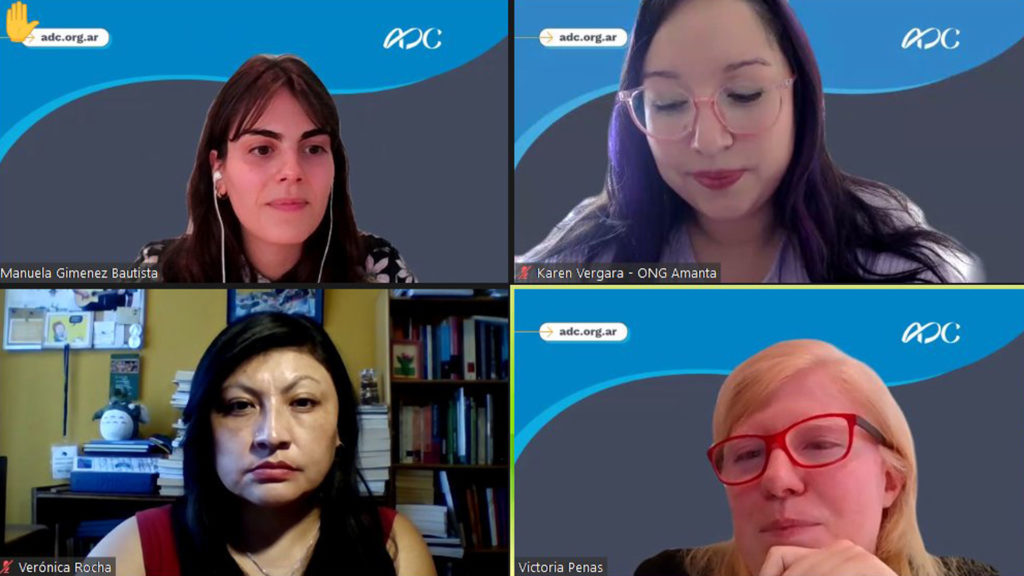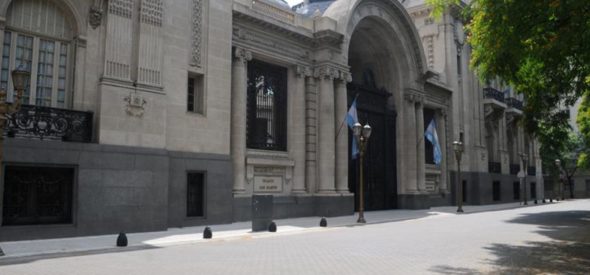ADC holds new edition of ADC in Focus debating gender and politics
On Wednesday, October 11, the Association for Civil Rights (ADC) organized a virtual conversation where specialists discussed gender-based violence against women in politics from a regional perspective, considering the current context of digital transformation.
Participants of this second edition of ADC in Focus were project assistants Victoria Penas (moderator) and Manuela Giménez Bautista, authors of the recent report Words that muzzle: self-censorship in women as a response to online gender-based violence, together with ADC 2023 Fellowship grantees, journalist Karen Vergara Sánchez (Chile) and social communicator Verónica Rocha (Bolivia).
The event took place via Zoom and began with the question of what is meant by violence against women in politics. In the first series of presentations, Karen Vergara Sánchez, also head of the Chilean organization Amaranta, explained that this type of aggression implies certain manifestations that bar women from achieving equal participation in politics. “Thus, we see that through this violenc, there is also an attempt to discipline their bodies in the political sphere,” she said.

In turn, Verónica Rocha examined political brutality in Bolivia, stressing that the understanding of this phenomenon has been strongly influenced by the regulatory framework outlined in the Bolivian Constitution of 2009, as well as the laws that seek to guarantee women’s political participation. However, she warned that “the normative structure is not enough; we must inquire on how to curb political violence in a country with a weak institutionalization.”
Likewise, Giménez Bautista referred to the struggle of women in Argentina to expand their rights, including gender equality in political participation, and stressed that despite its promulgation in the laws, there is still an old-fashioned social conception that relegates women to the private sphere. “We must be able to look into the norms that were designed for promoting women’s equal participation in politics and restrain the violence that can be exercised against them in this domain,” she stated.
The second session was centered on the question of the extent this type of aggression conditions female action in the online civic space. In her presentation, Vergara Sánchez referred to Chilean history, highlighting the appropriation of women’s bodies in the political realm and how this relates to the threat to their integrity, especially sexual violence. She also shared some of the findings of her study Sexual and Digital Political Violence in Chile, conducted as part of the ADC 2023 Fellowship.
Rocha, for her part, pondered the relationship between the digital divide, how the concept of political violence has evolved, and its impact on female participation in Bolivia. “Violence against women in politics means conditioning their activity in the civic space; many decide not to engage in our country because they experience symbolic, psychological, and sexual aggression, opting to give up,” she said.
Next, Giménez Bautista pointed out that the internet, especially social media, has amplified these forms of violence and affected the visibility and participation of women in the public sphere, limiting people’s access to political discourse. She also emphasized the importance of considering “the double impact, not only on those who endure aggression in the online sphere but the citizenry as a whole and, ultimately, on the quality of our democratic institutions.”
The last series of presentations focused on whether there is a trend toward equal political participation in the region.
Karen Vergara expressed mixed feelings and noted that Chile has been moving towards a fairer democracy, adopting measures such as gender parity in general or constituent elections, while warning that “these advances may be threatened by reactionary speech and the toxic masculinity it generates, leaving a sensation that the political realm is being alienated from, and eventually turning against us.”
Verónica Rocha affirmed that although Bolivia’s democracy aims to the achievement of intercultural parity, changes in the political scenario may be abrupt and there are challenges to be faced throughout the region such as anti-feminism.
Finally, Manuela Giménez Bautista pointed out that even though normative advances have been made to promote greater equality and the inclusion of women in the political sphere throughout the region, these efforts are not being matched by vigorous actions to ensure the effective integration of women and their equal participation.”
“The focus should not only be placed on the regulations but also on other areas where to achieve a culture of equal participation, with proposals for new forms of female engagement,” concluded ADC’s project assistant.

